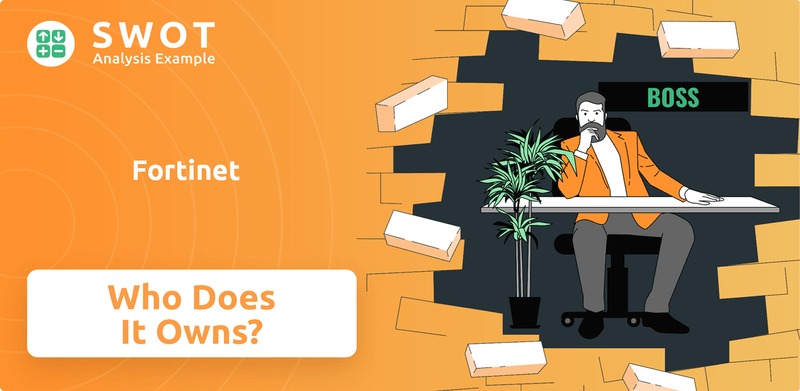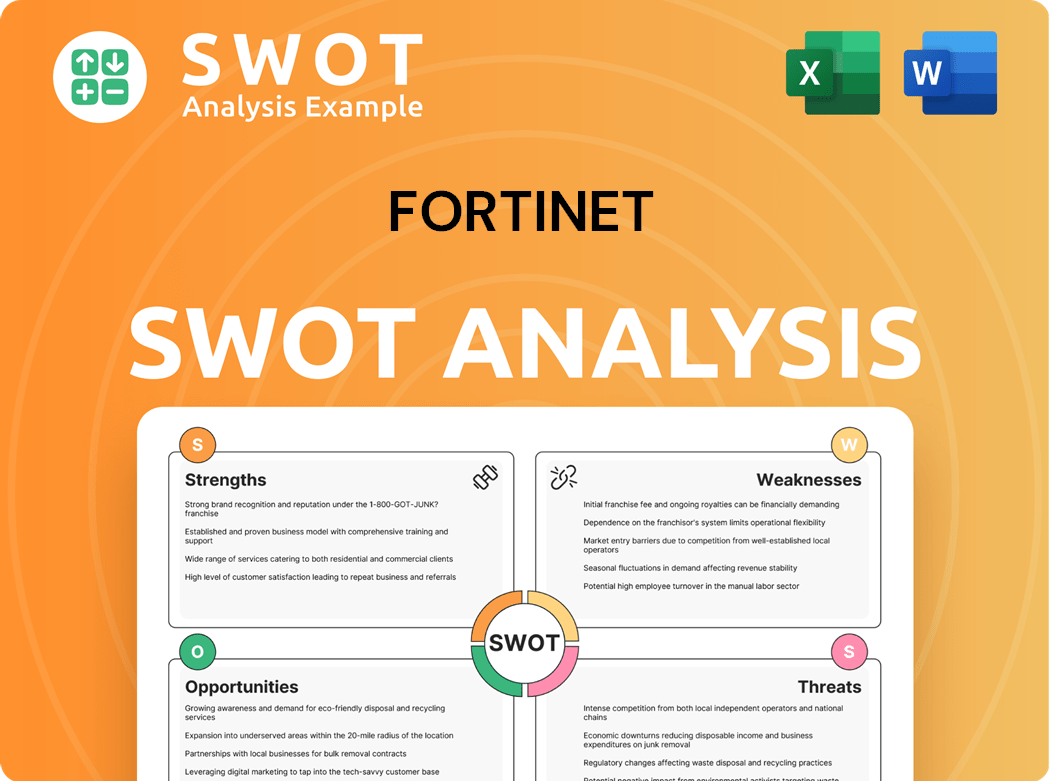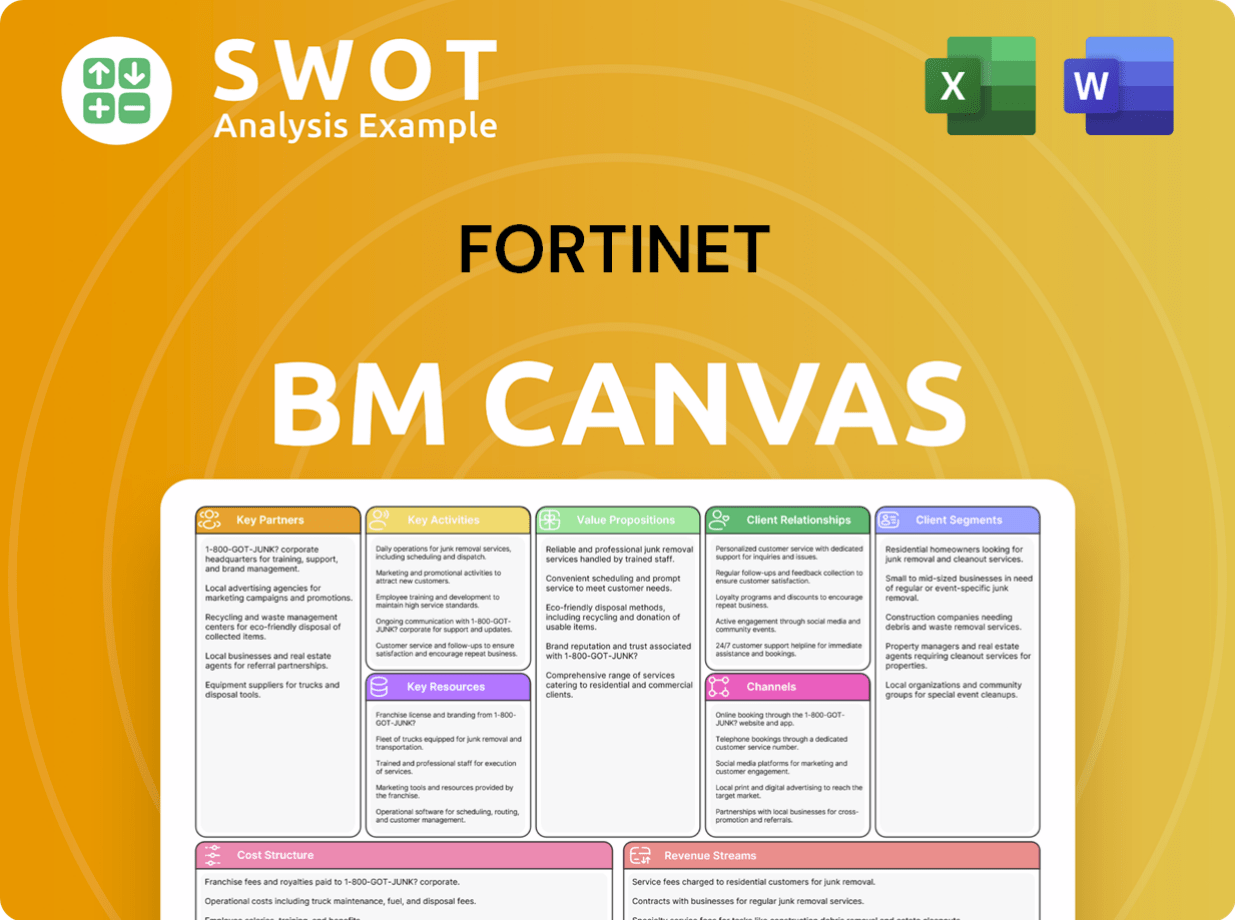Fortinet Bundle
Who Really Owns Fortinet?
Delving into the ownership of a tech giant like Fortinet is crucial for understanding its trajectory. The Fortinet SWOT Analysis is a great tool to start with. Discover how the blend of shareholders, from founders to institutional investors, shapes its strategic decisions and market dominance. Knowing "Who owns Fortinet" is key to grasping its future direction.

Fortinet's journey, from its founding by Ken Xie and Michael Xie to its current status, is a testament to its growth. Understanding the Fortinet company ownership structure unveils the influences that guide its cybersecurity innovations and financial strategies. This exploration of "Who owns Fortinet" offers insights into its governance, market position, and the key players driving its success, including the current Fortinet CEO and other key executives.
Who Founded Fortinet?
The Fortinet company was established in 2000 by brothers Ken Xie and Michael Xie. The company, headquartered in Sunnyvale, California, started with a vision to integrate security directly into IT infrastructure. This early focus on embedded security was a key element in the company's initial product offerings.
Ken Xie, who also founded Systems Integration Solutions (SIS) and NetScreen, has served as the CEO of the company since its inception. Michael Xie holds the positions of President and Chief Technology Officer. The company's first product, FortiGate, a physical firewall, was launched in May 2002.
Initial funding for the company came from various sources, including venture capital. By early 2003, the company had secured over $30 million in private funding. While specific equity splits or shareholding percentages at the company's inception are not publicly detailed, the founders' vision played a crucial role in the company's early development and product offerings.
Ken Xie and Michael Xie co-founded the company in 2000.
The first product, FortiGate, was a physical firewall launched in May 2002.
The company raised over $30 million in private funding by early 2003.
Ken Xie serves as the CEO, and Michael Xie is the President and CTO.
The company's headquarters is located in Sunnyvale, California.
The company's ownership structure evolved over time, with the founders playing a key role in its early development.
The early focus of the company was on embedded security solutions. The founders' vision was central to the company's initial product offerings and overall strategy.
- Ken Xie, the CEO, also founded other tech companies.
- Michael Xie, the President and CTO, was instrumental in technology development.
- The company's early funding rounds were critical for its initial growth.
- The company's headquarters has always been in Sunnyvale, California.
Fortinet SWOT Analysis
- Complete SWOT Breakdown
- Fully Customizable
- Editable in Excel & Word
- Professional Formatting
- Investor-Ready Format

How Has Fortinet’s Ownership Changed Over Time?
The evolution of Fortinet's ownership structure is marked by its initial public offering (IPO) in November 2009. This event, which saw the company listed on the Nasdaq under the ticker symbol FTNT, was a pivotal moment. It opened the doors to a wider array of investors, fundamentally changing the dynamics of Fortinet company ownership.
As of June 6, 2025, institutional investors held a significant stake, representing 66.76% of the total outstanding shares. This demonstrates the strong confidence institutional investors have in Fortinet's long-term prospects. In May 2025, institutional ownership was slightly higher at 67.31%, with mutual funds holding 20.45%.
| Shareholder Type | Stake Percentage (as of March 31, 2025) | Approximate Share Count (as of May 2025) |
|---|---|---|
| Vanguard Group Inc. | 9.36% | Not specified |
| BlackRock, Inc. | 7.66% | Not specified |
| State Street Corp | 3.7% | Not specified |
Key institutional investors include Vanguard Group Inc. (9.36% as of March 31, 2025), BlackRock, Inc. (7.66% as of March 31, 2025), and State Street Corp (3.7% as of March 31, 2025). Company insiders, including the founders, also maintain a substantial ownership position. As of May 2025, insider ownership stood at 8.16% of the total shares outstanding. Ken Xie, the co-founder and Fortinet CEO, held 7.86% of the shares (60,193,745 shares) as of May 2, 2025, which were valued at roughly $6.1 billion. Michael Xie, co-founder and board member, held 7.34% of the shares (56,203,110 shares) as of May 22, 2025, with a value of approximately $5.7 billion. The general public, primarily individual investors, held about 13.6% of the shares as of March 2025. This diverse ownership structure, encompassing institutional investors, insiders, and retail investors, influences the company's strategic direction and corporate governance through various voting rights and shareholder engagements. To understand more about the company, you can read about the Revenue Streams & Business Model of Fortinet.
The ownership of Fortinet is primarily held by institutional investors, with a significant portion also controlled by insiders and the general public.
- Institutional investors hold a majority stake, indicating strong market confidence.
- Company founders, Ken Xie and Michael Xie, maintain significant ownership.
- The IPO in 2009 was a crucial event in shaping the current ownership structure.
- Understanding the Fortinet company ownership structure is essential for investors.
Fortinet PESTLE Analysis
- Covers All 6 PESTLE Categories
- No Research Needed – Save Hours of Work
- Built by Experts, Trusted by Consultants
- Instant Download, Ready to Use
- 100% Editable, Fully Customizable

Who Sits on Fortinet’s Board?
The Board of Directors at the Fortinet company is pivotal in guiding its strategy and overseeing its operations. The composition of the board reflects the diverse ownership structure. While the most current details for 2025 are expected in the company's proxy statement, which will be filed within 120 days after the fiscal year 2024, it's known that co-founders Ken Xie and Michael Xie hold significant positions. Ken Xie serves as Founder, Chairman of the Board, and Chief Executive Officer, and Michael Xie is the Founder, President, and Chief Technology Officer, also a board member. Their influence is substantial, with Ken Xie owning 7.86% and Michael Xie owning 7.34% as of May 2025.
The board includes a mix of major shareholders, founders, and independent directors, each contributing to the company's governance. The specific roles and representation of each board member are detailed in the proxy statement. The board's structure is designed to ensure effective oversight and strategic direction for the company, considering the interests of all stakeholders. For more insights into the company's origins, you can explore the Brief History of Fortinet.
| Board Member | Title | Ownership (Approx. - May 2025) |
|---|---|---|
| Ken Xie | Founder, Chairman & CEO | 7.86% |
| Michael Xie | Founder, President & CTO | 7.34% |
| List of other Board Members | Various | Varies |
Fortinet's voting structure generally follows a one-share-one-vote system for its common stock. However, the company's governing documents contain provisions that can affect voting power. The board can issue preferred stock with voting rights, potentially impacting common stockholders' voting power. Furthermore, provisions are in place to ensure continuity of management, making changes to the board more structured. In June 2023, stockholders approved removing a supermajority voting requirement, streamlining certain decision-making processes.
Understanding the ownership structure of the Fortinet company is crucial for investors and stakeholders.
- Co-founders Ken and Michael Xie have significant influence.
- The board includes a mix of major shareholders, founders, and independent directors.
- Voting rights are primarily one share, one vote, but with certain provisions.
- The company's structure is designed for effective governance and strategic direction.
Fortinet Business Model Canvas
- Complete 9-Block Business Model Canvas
- Effortlessly Communicate Your Business Strategy
- Investor-Ready BMC Format
- 100% Editable and Customizable
- Clear and Structured Layout

What Recent Changes Have Shaped Fortinet’s Ownership Landscape?
In the past few years, the ownership structure of the Fortinet company has seen shifts driven by market dynamics and strategic actions. As of May 2025, institutional investors maintained a substantial presence, holding approximately 67.31% of the shares. Insider holdings showed a slight decrease from 36.53% to 36.07%, and mutual funds also experienced a minor reduction from 204.58% to 204.52%.
Fortinet has engaged in capital management, including increasing its authorized stock repurchase amount to $8.25 billion, with the program extended to February 28, 2026. In 2024, the company repurchased less than 0.1 million shares for $0.6 million. Acquisitions such as Lacework and Next DLP in 2024 are aimed at enhancing cloud security and data loss prevention capabilities, potentially influencing ownership through share allocations.
| Ownership Category | May 2024 | May 2025 |
|---|---|---|
| Institutional Investors | 67.31% | 67.31% |
| Insider Holdings | 36.53% | 36.07% |
| Mutual Funds | 204.58% | 204.52% |
Industry trends show increased institutional ownership, which Fortinet aligns with, as institutions hold a significant portion of its shares. Founders Ken and Michael Xie continue to hold substantial individual stakes, demonstrating their ongoing commitment. Public statements in 2025 included Q1 2025 financial results, with total revenue of $1.54 billion, up 14% year over year, and projected full-year 2025 revenue between $6.650 billion and $6.850 billion. These financial performances and strategic acquisitions indicate proactive market growth and adaptation within the cybersecurity landscape. For more insights into the company's strategic direction, consider reading about the Growth Strategy of Fortinet.
Institutional investors are the primary owners of Fortinet. Insider ownership, including founders, is also significant. The company's ownership structure reflects a mix of institutional and insider influence.
Recent trends show stable institutional ownership and a slight decrease in insider holdings. Fortinet continues to manage its capital through share repurchases. Strategic acquisitions are also influencing the ownership dynamics.
Acquisitions like Lacework and Next DLP can affect ownership. These deals may involve issuing new shares or reallocating existing ones. Such actions can reshape the shareholder base.
Strong financial results, such as Q1 2025 revenue of $1.54 billion, can boost investor confidence. Positive financial performance often supports stable or increasing ownership by institutional investors.
Fortinet Porter's Five Forces Analysis
- Covers All 5 Competitive Forces in Detail
- Structured for Consultants, Students, and Founders
- 100% Editable in Microsoft Word & Excel
- Instant Digital Download – Use Immediately
- Compatible with Mac & PC – Fully Unlocked

Related Blogs
- What are Mission Vision & Core Values of Fortinet Company?
- What is Competitive Landscape of Fortinet Company?
- What is Growth Strategy and Future Prospects of Fortinet Company?
- How Does Fortinet Company Work?
- What is Sales and Marketing Strategy of Fortinet Company?
- What is Brief History of Fortinet Company?
- What is Customer Demographics and Target Market of Fortinet Company?
Disclaimer
All information, articles, and product details provided on this website are for general informational and educational purposes only. We do not claim any ownership over, nor do we intend to infringe upon, any trademarks, copyrights, logos, brand names, or other intellectual property mentioned or depicted on this site. Such intellectual property remains the property of its respective owners, and any references here are made solely for identification or informational purposes, without implying any affiliation, endorsement, or partnership.
We make no representations or warranties, express or implied, regarding the accuracy, completeness, or suitability of any content or products presented. Nothing on this website should be construed as legal, tax, investment, financial, medical, or other professional advice. In addition, no part of this site—including articles or product references—constitutes a solicitation, recommendation, endorsement, advertisement, or offer to buy or sell any securities, franchises, or other financial instruments, particularly in jurisdictions where such activity would be unlawful.
All content is of a general nature and may not address the specific circumstances of any individual or entity. It is not a substitute for professional advice or services. Any actions you take based on the information provided here are strictly at your own risk. You accept full responsibility for any decisions or outcomes arising from your use of this website and agree to release us from any liability in connection with your use of, or reliance upon, the content or products found herein.